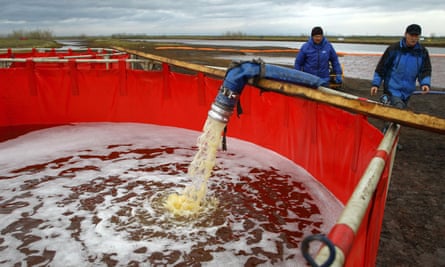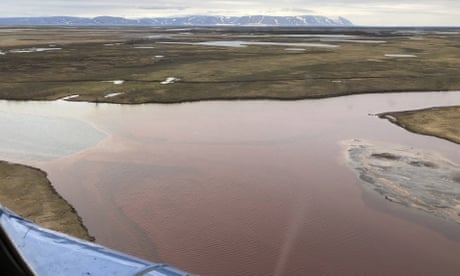Officials in Siberia have warned fuel spill could take years to clean up

Officials in Siberia have warned that it will take years to clean up a massive fuel spill in the Arctic Circle, as investigators detained three employees of a power plant where the disaster originated.
More than 21,000 tonnes of fuel was released when a fuel reservoir collapsed last month at a power plant operated by a subsidiary of metals giant Norilsk Nickel in the city of Norilsk.
It is the largest ever to have hit the Arctic, say environmentalists.
Investigators said Wednesday they had detained the director of the power station and two engineers on suspicion of breaching environmental protection rules.
If convicted, they would risk up to five years in prison.
“The company considers this measure to be unjustifiably harsh,” Norilsk Nickel said in a statement, adding that the three detainees are all “cooperating with law enforcement authorities [although] they would be much more useful at the scene of the clean-up operation.”
Viktor Bronnikov, general director of Transneft Siberia – an oil and gas transportation company involved in the clean-up – said that the situation was stabilising, but that the clean-up team had seen animals and birds apparently killed by the spill.
“If a bird lands on the diesel fuel or a muskrat swims through it, it is condemned to death,” he said.
Workers in waterproofs were using booms to contain the reddish-brown diesel on the surface of a river and pump it into tanks on the bank.
“We will be removing diesel fuel from the Ambarnaya River for at least eight to 10 days,” Bronnikov said. “We will need years to completely clean up,.”
Norilsk Nickel head Vladimir Potanin said the company would pay for clean-up efforts estimated at $146 million after president Vladimir Putin backed a state of emergency in the Arctic city.
Investigators said the power plant’s fuel tank had required major repairs from 2018 but the suspects “continued to use it in breach of safety rules.”
Norilsk Nickel said that the fuel reservoir was built in 1985 and underwent repairs in 2017 and 2018, after which it went through a safety audit.
Regional officials have said that despite efforts to contain the fuel leak using booms on the river surface, it has now reached a freshwater lake that is a major source of water for the region.
The pollution could now flow into the Kara Sea in the Arctic Ocean north of Siberia, which Greenpeace Russia expert Vladimir Chuprov told AFP would be a “disaster.”
Follow us on twitter (ajuede.com) or on Instagram (ajuedeman) for details of the global situation presently.






.jpeg)
Comments
Post a Comment